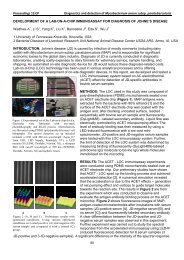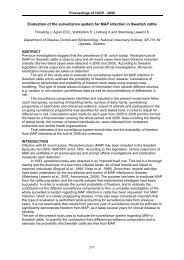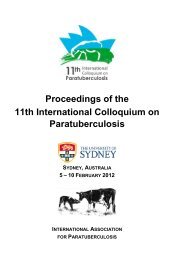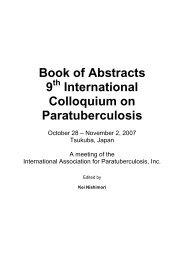Proceedings of the 10th International Colloquium on Paratuberculosis
Proceedings of the 10th International Colloquium on Paratuberculosis
Proceedings of the 10th International Colloquium on Paratuberculosis
You also want an ePaper? Increase the reach of your titles
YUMPU automatically turns print PDFs into web optimized ePapers that Google loves.
#198<br />
Use <str<strong>on</strong>g>of</str<strong>on</strong>g> small experience groups to enhance knowledge and increase motivati<strong>on</strong> <str<strong>on</strong>g>of</str<strong>on</strong>g> farmers in<br />
<str<strong>on</strong>g>the</str<strong>on</strong>g> process <str<strong>on</strong>g>of</str<strong>on</strong>g> c<strong>on</strong>trolling paratuberculosis<br />
Peter Raundal, Lene Trier<br />
Danish Dairy Board, Denmark; Vildbjerg Dyreklinik, Denmark<br />
The organic co-operative dairy Thise Dairy decided in 2008 to eradicate paratuberculosis from <str<strong>on</strong>g>the</str<strong>on</strong>g>ir member<br />
herds. C<strong>on</strong>tinued focus <strong>on</strong> transmissi<strong>on</strong> <str<strong>on</strong>g>of</str<strong>on</strong>g> Mycobacterium avium subsp. paratuberculosis (MAP) for a period <str<strong>on</strong>g>of</str<strong>on</strong>g><br />
5-10 years will be needed to achieve eradicati<strong>on</strong>.<br />
The objective <str<strong>on</strong>g>of</str<strong>on</strong>g> this project was <str<strong>on</strong>g>the</str<strong>on</strong>g>refore to enhance knowledge and increase motivati<strong>on</strong> <str<strong>on</strong>g>of</str<strong>on</strong>g> farmers in<br />
<str<strong>on</strong>g>the</str<strong>on</strong>g> process <str<strong>on</strong>g>of</str<strong>on</strong>g> c<strong>on</strong>trolling paratuberculosis cost-effectively.<br />
The 83 member herds were divided into 8 small experience groups, and a facilitator was associated with<br />
each group. The group meet every 6 m<strong>on</strong>th at <strong>on</strong>e <str<strong>on</strong>g>of</str<strong>on</strong>g> <str<strong>on</strong>g>the</str<strong>on</strong>g> farms, and <str<strong>on</strong>g>the</str<strong>on</strong>g> owner describes how c<strong>on</strong>trol <str<strong>on</strong>g>of</str<strong>on</strong>g> MAP<br />
is managed and <str<strong>on</strong>g>the</str<strong>on</strong>g> group give feed back. The role <str<strong>on</strong>g>of</str<strong>on</strong>g> <str<strong>on</strong>g>the</str<strong>on</strong>g> facilitator is to ensure that <str<strong>on</strong>g>the</str<strong>on</strong>g> group discuss <str<strong>on</strong>g>the</str<strong>on</strong>g> different<br />
risk areas and provide advice to <str<strong>on</strong>g>the</str<strong>on</strong>g> owner, and to summarise <str<strong>on</strong>g>the</str<strong>on</strong>g> advice given by <str<strong>on</strong>g>the</str<strong>on</strong>g> group.<br />
The actual management related to factors <str<strong>on</strong>g>of</str<strong>on</strong>g> importance to transmissi<strong>on</strong> <str<strong>on</strong>g>of</str<strong>on</strong>g> MAP was recorded by May<br />
2008 through a questi<strong>on</strong>naire. The results showed that approximately 75% <str<strong>on</strong>g>of</str<strong>on</strong>g> <str<strong>on</strong>g>the</str<strong>on</strong>g> farmers did not have management<br />
practices sufficient to c<strong>on</strong>trol MAP. Subsequently, each group have had two herd visits and <str<strong>on</strong>g>the</str<strong>on</strong>g> farmers<br />
have been intensively involved in providing advice, which should result in reducing <str<strong>on</strong>g>the</str<strong>on</strong>g> number <str<strong>on</strong>g>of</str<strong>on</strong>g> herds<br />
with insufficient management practices, which can reduce MAP transmissi<strong>on</strong>. The outcomes <str<strong>on</strong>g>of</str<strong>on</strong>g> <str<strong>on</strong>g>the</str<strong>on</strong>g> project so<br />
far are: a) farmers do believe that experience groups are valuable and approximately 2/3 <str<strong>on</strong>g>of</str<strong>on</strong>g> <str<strong>on</strong>g>the</str<strong>on</strong>g> farmers participate<br />
in each group sessi<strong>on</strong>; and b) <str<strong>on</strong>g>the</str<strong>on</strong>g> quality <str<strong>on</strong>g>of</str<strong>on</strong>g> <str<strong>on</strong>g>the</str<strong>on</strong>g> discussi<strong>on</strong>s and advices given have increased since<br />
<str<strong>on</strong>g>the</str<strong>on</strong>g> first meeting. The management practices will be recorded again in September 2008 to determine if <str<strong>on</strong>g>the</str<strong>on</strong>g><br />
approach has resulted in improved management practices. However, many farmers have already improved<br />
<str<strong>on</strong>g>the</str<strong>on</strong>g>ir practices and appear to be highly motivated for c<strong>on</strong>tinuing <str<strong>on</strong>g>the</str<strong>on</strong>g> c<strong>on</strong>trol process.<br />
201






